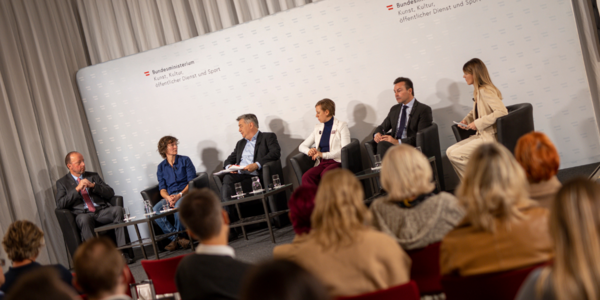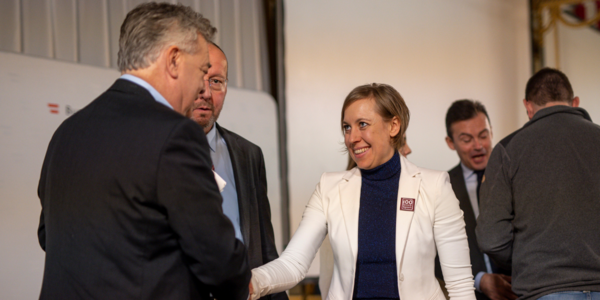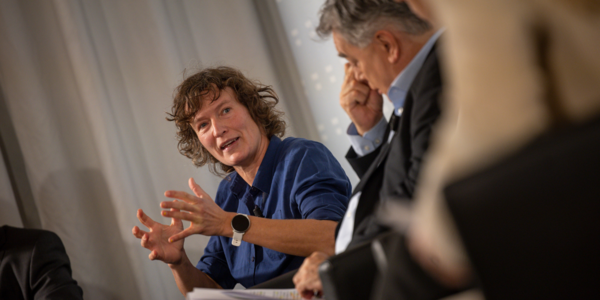1. Integrity Day – Report
The 1st Integrity Day of Austrian Sport took place on 27 November at the Haus des Sports. It was organised by the Ministry of Sport and the four sports organisations that promote integrity in sport (NADA Austria, Play Fair Code, 100 % Sport, FairPlay Initiative). The new "Good Governance" funding programme of the Federal Ministry of Arts, Culture, the Civil Service and Sport was presented in this context.
The aim of this programme is to raise awareness of the topics of good governance and compliance among umbrella and professional associations as well as Austria-wide sports organisations, i.e. all nationwide funding recipients of the Ministry of Sport. The approximately 70 sports institutions have until the end of February 2024 to use the questionnaire to assess the extent to which they meet the requirements of good governance and compliance in ten categories. The categories are: Transparency, democratic processes, representation and participation, separation of powers and control, code of conduct and conflicts of interest, complaints and appeals, equality and anti-discrimination, protection of children and violence, sustainability and finally integrity. Each principle is subdivided into eight to twelve questions. Bundes-Sport GmbH will then analyse the results, evaluate them using a points system, carry out checks and draw up a ranking.
The professional associations have the opportunity to gain extra funding through a correspondingly good performance in the sense of an incentive system. In order to create equal opportunities, the 60 professional associations were divided into three groups according to their size (measured in terms of funding). The top five in each group receive extra funding of 50, 40, 30, 20 and 10,000 euros. In addition, two special prizes of 10 and 5,000 euros per category are awarded to those professional associations that achieve the full number of points for most of the principles. A total of 500,000 euros is therefore available each year. Up to 21 trade associations can benefit from extra funding per test cycle, with additional funding of up to 60,000 euros per trade association.
In addition to the bonuses, all associations and sports organisations have the opportunity to receive a seal of quality if they achieve a certain benchmark. From 67 (out of 100) points, the certificate "Good Practice in Good Governance" is awarded, from 90 points "Best Practice in Good Governance".
https://www.fairplay.or.at/en/archive/1-integrity-day-report#top
Vice-Chancellor and Sports Minister Werner Kogler: "Sport is a role model when it comes to integrity and fairness. There is still enough to do. Particular attention has been paid to this in this government period. The establishment of the umbrella brand IRIS, Institutions for Respect and Safety in Sport, and the associated creation of a dedicated centre have underlined its importance. The common denominator is fair behaviour, whether personal, bilateral or between organisations. It is our task to bring out the best in ourselves and society and to push back the negative.
Good governance is primarily about preventative concepts. That is why this funding programme looks very closely at the state of transparency, democratic processes, separation of powers and control. The programme asks about concepts to combat abuse of power and sexual harassment, for equality and anti-discrimination or sustainability in sport.
From 2024 to 2026, the programme will rely heavily on financial incentives and additional funding. 500,000 per year, totalling 1.5 million euros, is available for this purpose. After this transition phase, the funding requirements will be increasingly adapted."
https://www.fairplay.or.at/en/archive/1-integrity-day-report#top
Severin Moritzer, Managing Director of the Play Fair Code: "Not knowing the outcome is a basic requirement in sporting competition. Betting fraud is essentially about minimising performance, which massively jeopardises sporting credibility. However, fraud also jeopardises the economic foundations. Unfortunately, betting fraud is very prevalent in Austria. However, it is certainly more noticeable today because people are looking much more closely.
A lot needs to be done in the associations to implement good governance. Many of them cannot afford their own people or positions. Financial incentives can be an effective incentive system for this."
Michael Cepic, Managing Director of NADA Austria: "Doping is certainly the oldest integrity issue in sport. The WADA Code was created in 1999 and is implemented in Austria via NADA and the Anti-Doping Act. There is no room for manoeuvre when it comes to implementation, which is why there is a certain special status here and a separate law. The perception of clean sport has increased significantly. We are also being asked more and more often why there have been no doping tests at an event if they are not recognised. However, the economic incentive is so great that there will always be doping. There are many prejudices in sport in particular - for example that everyone is doped. Athletes also have a role to play in communicating against these prejudices."
https://www.fairplay.or.at/en/archive/1-integrity-day-report#top
Claudia Koller, Managing Director of 100% Sport: "Creating gender equality is a multifaceted challenge that cannot be solved by sport alone. However, sport must fulfil its responsibility. As a centre for gender competence, we can offer support services and promote awareness-raising. If, for example, a female referee is refused a handshake and told to go home to the cooker, the integrity of sport is just as threatened as it is by doping or betting fraud.
Individual measures, such as the installation of gender officers, are important but not enough. In any case, it is not enough to put a concept on paper. What is essential is the implementation and fulfilment of the objectives. The question always arises as to the extent to which the people responsible are equipped with resources. We often hear the tenor: We have more important things to do. This funding programme can and should have an impact on the setting of priorities in sports organisations."
Nikola Staritz, fairplay initiative at the VIDC: "Discrimination is visible in many forms in sport, we hear fan chants, we see how committees are made up. How fair can sport be if significant sections of the population are significantly less represented than others? There is double or multiple discrimination, for example in the case of women who are discriminated against on the basis of their origin or sexual orientation. Sport brings people together who would otherwise probably never meet in life. However, it also has the task of taking a close look when misbehaviour becomes apparent.
It is important to raise awareness of what constitutes discriminatory behaviour. Language is a key factor here. Sports organisations and clubs can implement measures that are easy to implement and require little effort. There is often a fear that this is difficult to implement in organisational terms alongside all the other voluntary activities. Our programmes are designed to counteract this."
https://www.fairplay.or.at/en/archive/1-integrity-day-report#top
https://www.fairplay.or.at/en/archive/1-integrity-day-report#top






